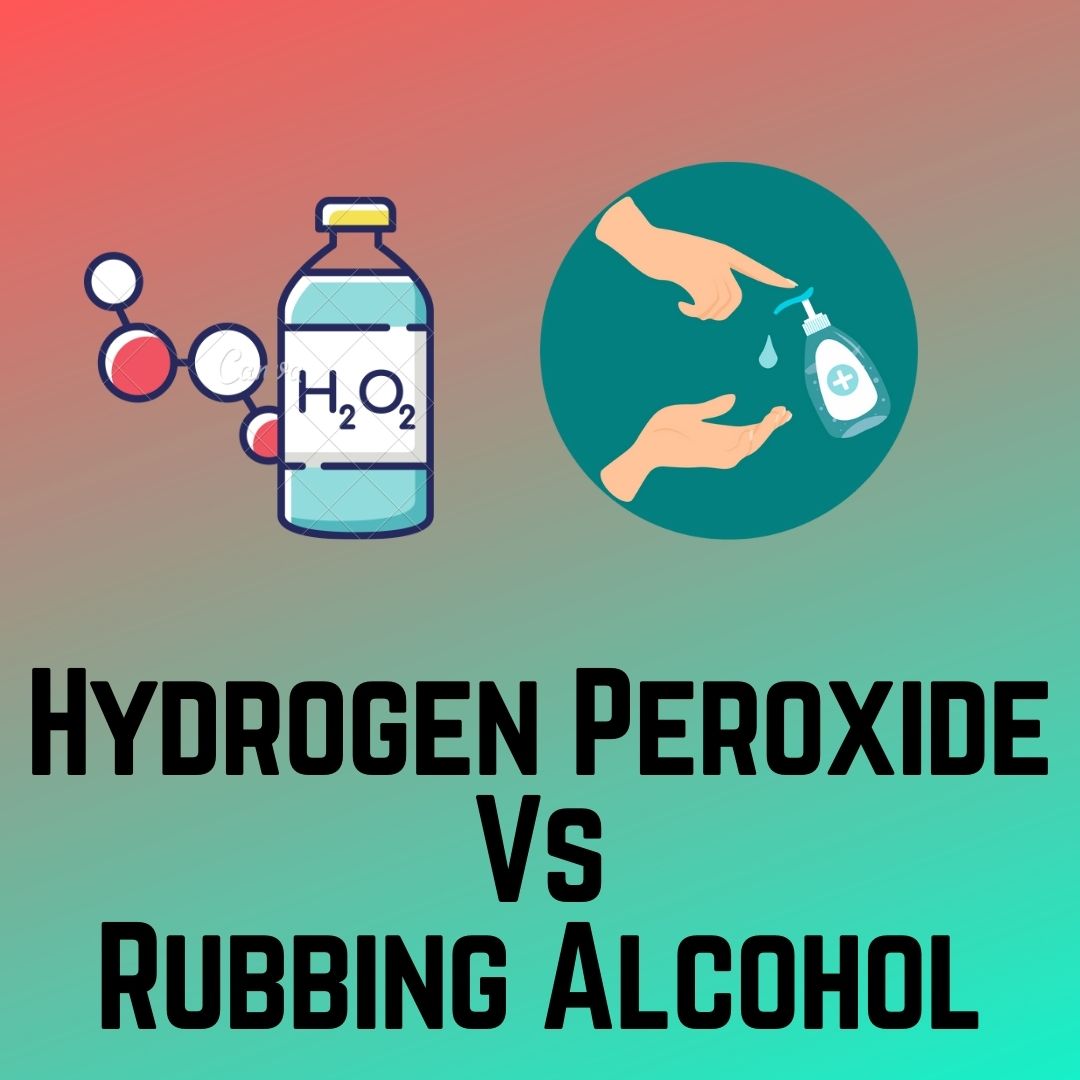
Hydrogen peroxide and rubbing alcohol are both commonly found in households and are used for various purposes, but they serve different functions and have distinct properties. Let’s explore the differences between hydrogen peroxide and rubbing alcohol:
Hydrogen Peroxide:
1. Chemical Composition:
- Hydrogen peroxide has the chemical formula H₂O₂, indicating it consists of two hydrogen atoms and two oxygen atoms. It is a pale blue liquid that appears colorless when diluted.
2. Common Concentrations:
- Household hydrogen peroxide is typically available in concentrations of 3%, which is suitable for general use. Stronger concentrations are available for industrial and medical purposes.
3. Use as an Antiseptic:
- Hydrogen peroxide is commonly used as an antiseptic for cleaning wounds. When applied to cuts or wounds, it releases oxygen and helps kill bacteria, preventing infection.
4. Foaming Action:
- When hydrogen peroxide comes into contact with biological material, such as bacteria or blood, it undergoes a foaming reaction due to the release of oxygen. This helps in the mechanical removal of debris.
5. Use as a Mouthwash:
- Some people use diluted hydrogen peroxide as a mouthwash for its antiseptic properties. However, it should be used with caution and in moderation.
6. Household Cleaning:
- Hydrogen peroxide can be used as a household cleaner and disinfectant. It is effective against bacteria, viruses, and molds.
7. Hair Bleaching:
- In higher concentrations, hydrogen peroxide is used as a hair bleach. It breaks down the melanin in hair, resulting in a lightening effect.
Rubbing Alcohol (Isopropyl Alcohol or Ethanol):
1. Chemical Composition:
- Rubbing alcohol is typically isopropyl alcohol or ethanol. Isopropyl alcohol has the chemical formula C₃H₈O, and ethanol has the formula C₂H₅OH.
2. Common Concentrations:
- Isopropyl alcohol is commonly available in concentrations of 70% or 90%, while ethanol (ethyl alcohol) is often found in concentrations of 70% for general use.
3. Use as a Disinfectant:
- Rubbing alcohol is a powerful disinfectant. It can be applied to surfaces, skin, and medical instruments to kill bacteria and viruses.
4. Evaporation Rate:
- Rubbing alcohol evaporates quickly, which makes it suitable for cleaning and disinfecting surfaces.
5. Use as a Cooling Agent:
- Isopropyl alcohol is sometimes used as a cooling agent for body temperature reduction in fever cases. However, this should be done under medical supervision.
6. Hand Sanitizer Ingredient:
- Ethanol is a common ingredient in hand sanitizers due to its antiseptic properties.
7. Not for Internal Use:
- Rubbing alcohol should not be ingested, as it is toxic. It can cause adverse effects on the central nervous system, respiratory system, and other organs.
Key Differences:
1. Primary Use:
- Hydrogen peroxide is primarily used as a wound disinfectant and household cleaner, while rubbing alcohol is commonly used as a surface disinfectant and antiseptic.
2. Chemical Composition:
- Hydrogen peroxide is composed of hydrogen and oxygen, while rubbing alcohol is either isopropyl alcohol or ethanol.
3. Foaming Reaction:
- Hydrogen peroxide exhibits a foaming reaction when applied to wounds, while rubbing alcohol does not.
4. Evaporation Rate:
- Rubbing alcohol evaporates quickly, making it suitable for rapid disinfection, while hydrogen peroxide may linger on surfaces for a longer time.
5. Toxicity:
- Rubbing alcohol is toxic if ingested and should not be consumed, whereas hydrogen peroxide, if used in low concentrations for wound care, is less likely to cause harm.
Safe Use and Precautions:
Hydrogen Peroxide:
- Dilution:
- For wound care, it is crucial to dilute hydrogen peroxide to a 3% concentration using sterile water before application. Higher concentrations can be too harsh on the skin and may slow down the healing process.
- Avoiding Ingestion:
- Hydrogen peroxide should not be ingested, as higher concentrations can cause irritation to the gastrointestinal tract and pose health risks.
- Storage:
- Store hydrogen peroxide in a cool, dark place, away from direct sunlight. Exposure to light can cause the breakdown of hydrogen peroxide into water and oxygen, reducing its effectiveness.
- Expiration Date:
- Check the expiration date on the hydrogen peroxide container. Expired solutions may be less effective or potentially harmful.
Rubbing Alcohol:
- Avoiding Ingestion:
- Rubbing alcohol, whether isopropyl or ethanol, should never be ingested. Ingesting even small amounts can lead to poisoning and severe health consequences.
- Ventilation:
- When using rubbing alcohol for cleaning or disinfecting surfaces, ensure proper ventilation to avoid inhaling fumes.
- Avoiding Open Flames:
- Due to its flammable nature, rubbing alcohol should be kept away from open flames, sparks, and heat sources.
- Skin Contact:
- Prolonged or repeated skin contact with rubbing alcohol can cause dryness and irritation. It is advisable to use protective measures such as gloves when handling large quantities.
Conclusion
In summary, hydrogen peroxide and rubbing alcohol serve different purposes. Hydrogen peroxide is commonly used for wound care and household cleaning, while rubbing alcohol is a versatile disinfectant for surfaces, skin, and medical instruments. It’s essential to use each product according to its intended purpose and follow safety guidelines to avoid misuse or adverse effects.
Frequently Asked Questions (FAQs):
1. Can I Use Hydrogen Peroxide on Cuts and Wounds?
- Yes, hydrogen peroxide is commonly used on cuts and wounds to clean and disinfect. However, it is essential to dilute it to a 3% concentration to avoid skin irritation.
2. Can Rubbing Alcohol Be Used as a Hand Sanitizer?
- Yes, rubbing alcohol with at least 60% concentration (ethanol or isopropyl) can be used as a hand sanitizer to effectively kill germs. However, commercially available hand sanitizers are often more user-friendly.
3. Is Hydrogen Peroxide Safe for Cleaning Around the House?
- Yes, hydrogen peroxide is safe for general household cleaning. It can be used to disinfect surfaces, clean bathrooms, and sanitize kitchen areas.
4. Can I Use Rubbing Alcohol to Disinfect Electronics?
- Yes, rubbing alcohol can be used to disinfect electronics such as smartphones and keyboards. However, it’s advisable to use isopropyl alcohol and apply it to a cloth, rather than spraying it directly on the device.
5. What Happens If Rubbing Alcohol Is Ingested?
- Ingesting rubbing alcohol can lead to alcohol poisoning, resulting in symptoms such as dizziness, nausea, vomiting, and in severe cases, respiratory failure. Immediate medical attention is required.
6. Can I Mix Hydrogen Peroxide and Rubbing Alcohol?
- It is generally not recommended to mix hydrogen peroxide and rubbing alcohol. While both are effective disinfectants, combining them may not enhance their efficacy and can produce potentially harmful reactions.
7. Can Hydrogen Peroxide Bleach Clothes?
- Yes, hydrogen peroxide can be used as a bleach alternative for clothes. It is effective in removing stains and brightening whites. However, it is advisable to test a small, inconspicuous area first.
8. Can I Use Rubbing Alcohol for Acne Treatment?
- While rubbing alcohol has some antibacterial properties, it is not recommended for acne treatment as it can be too harsh on the skin. It may lead to dryness and irritation, worsening acne.
In conclusion, while hydrogen peroxide and rubbing alcohol have distinct uses, it is crucial to follow safety guidelines and use them appropriately. Both substances have valuable applications in wound care, cleaning, and disinfection, but misuse or improper handling can lead to adverse effects. Always read product labels, follow instructions, and seek professional advice when needed.

My name is Logan, and I’m a 36-year-old dad who owns a small pressure-washing company in the suburbs of Atlanta, Georgia. My main goal with rubbing-alcohol.com is to show you how versatile isopropyl rubbing alcohol can be! I hope. You find it useful.
